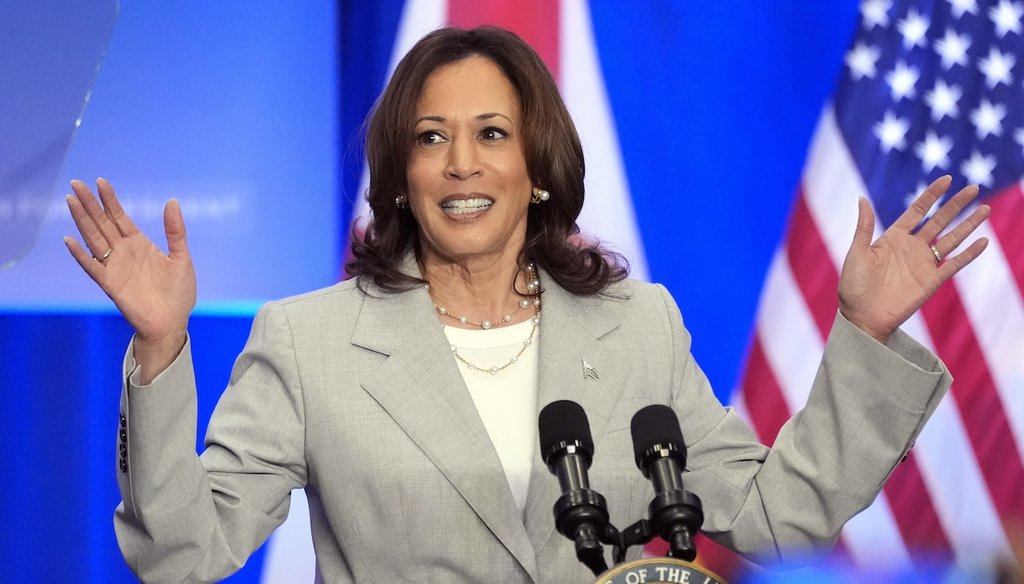Get PolitiFact in your inbox.

Vice President Kamala Harris speaks May 1, 2024, in Jacksonville, Fla. (AP)
Within a half-hour of announcing his withdrawal from the 2024 presidential campaign, President Joe Biden endorsed Vice President Kamala Harris for the Democratic presidential nomination.
"My very first decision as the party nominee in 2020 was to pick Kamala Harris as my Vice President. And it’s been the best decision I’ve made," Biden said in a July 21 X post. "Today I want to offer my full support and endorsement for Kamala to be the nominee of our party this year."
Harris said she was honored and that she intended to "earn and win this nomination."
Whether she will take the spot as the party’s nominee remains to be determined.
PolitiFact has fact-checked Harris 46 times since 2012 in her roles as California attorney general, U.S. senator, Democratic presidential candidate and vice president. Her vice presidency was one of firsts: She is the first woman and first Black and Asian person to hold the position.
Here’s a look at Harris’ fact-checked comments on topics including abortion and the economy and her potential 2024 opponents, Donald Trump and his running mate, Sen. JD Vance.
Abortion
Harris has become a leading Democratic voice on reproductive rights since the Supreme Court’s 2022 Roe v. Wade reversal.
She often talks about the stakes for American women.
After launching a national tour in January from Wisconsin to promote the Biden administration’s commitment to abortion rights, Harris correctly said that "1 in 3 women of reproductive age live in a state with an abortion ban." Our reporting found that about 21.5 million women of reproductive age — 15 to 49 — live in states that ban abortions after six weeks of pregnancy. That’s about 29% of U.S. women in this age group; the percentage is higher when more states with later abortion cutoffs are included.
But Harris has mischaracterized Republicans’ stances on abortion.
In January, Harris falsely said Republican lawmakers in Wisconsin reinstated an 1849 law to "stop abortion." An 1849 ban did take effect after the Supreme Court’s Roe v. Wade reversal, but Wisconsin’s Republican lawmakers didn’t play a role in reinstating that ban.
Attacks on Trump/Vance
In May, Harris said former President Donald Trump told Time magazine that "states have the right to monitor pregnant women" to enforce abortion bans, and that "states have the right to punish pregnant women for seeking out abortion care."
We rated that Mostly True. In a Time interview, Trump acknowledged that states have the right to do this but would not share his opinion about whether they should.
Harris has also attacked Vance, the Republican vice presidential nominee. In a July 17 campaign video, Harris claimed, "Unlike Mike Pence, Vance said he would have carried out Trump’s plan to overturn the 2020 election." We rated that Mostly True.
In media interviews, Vance hasn’t directly said he would have overturned the election. But he said the 2020 election was "stolen" from Trump and said he supported Trump’s plan to present Congress with alternate slates of electors on Jan. 6, 2021, that showed Trump winning battleground states he actually had lost.
Economy
During an October 2023 interview, Harris claimed that "because of our economic policies, we now are reducing inflation." We rated that Mostly False. Economists said some Biden administration policies might have helped marginally, but primarily attributed reduced inflation to Federal Reserve interest rate hikes, which the administration doesn’t control.
We rated Mostly True Harris’ claim that "Latino small businesses are 1 in 4 new businesses, but only 1% of venture capital funding goes to Latino businesses." A 2021 consulting company report found that from 2007 to 2017, Latino-owned businesses received roughly 1% of funding from the top 25 venture capitalists and private equity firms.
At a 2021 conference, Harris overstated the cost of corruption, saying, "The global cost of corruption is as much as 5% of the world’s GDP." Some anecdotal evidence supported a 5% estimate, but we rated that claim False after finding that no one could tell us where that often-cited statistic came from or what data or research was used to derive it.
Gun violence and criminal justice
In April, when touting the Biden administration’s efforts to curb gun violence, Harris said data showed "as many as 75% of school shootings resulted from a gun that was not secured."
We rated that statement Mostly False. Harris cited a 2019 study that found that some school shooters — about 48% — acquired firearms that were considered unsecured or easily accessible in family homes. Experts said more robust data is needed to better understand the link between gun storage and school shootings.
In April 2023, Harris said "a heartbreaking 1 in 5 Americans has lost a family member to gun violence." That’s Mostly True; a March 2023 survey by KFF, a health policy research, polling, and news organization, found that 19% of U.S. adults have a family member who was killed by a gun, including by suicide.
When Harris ran for president in the 2020 primary, we looked at her record as California attorney general and San Francisco’s district attorney. She achieved some notable criminal justice reform-minded victories, including efforts to reduce recidivism and eliminate bias in law enforcement. At other times, Harris’ positions disappointed criminal justice reform advocates; she had a reputation of being "cautious" on some issues.
We also found that she made a Full Flop on whether police shootings should undergo independent investigations; as of May 2019, she said she supports them.
Education
A year ago, Harris visited Florida and criticized efforts by Republican Gov. Ron DeSantis and other state officials to affect classroom curriculum. She said Florida "decided middle school students will be taught that enslaved people benefited from slavery." We rated that claim Mostly True: At the time, the Florida state education board approved middle school standards that said students should learn about "skills" learned by enslaved people that could be "applied for their personal benefit." Historians who studied slavery said such language is factually misleading and offensive.
Around the same time, Harris also inaccurately claimed that some states tried "to ban teaching Latino and Hispanic history." She cited flawed examples as support for her claim, such as a 2010 Arizona law that banned ethnic studies from being taught at public schools. A federal court overturned the law in 2017. Although some states have laws banning the teaching of critical race theory — a broad set of ideas, rooted in legal academia, about racism being woven into American systems — those laws don’t explicitly ban teaching Latino or Hispanic studies. We rated her claim Mostly False.
Republicans’ misleading attack against Harris’ border responsibility
In March 2021, Biden tasked Harris with working alongside Mexico and the Northern Triangle countries — Guatemala, El Salvador and Honduras — to address the root causes that make people migrate to the United States.
Republicans began calling Harris the "border czar" soon after. The nickname flourished during the Republican National Convention in July, when Trump and multiple speakers blamed Harris for record-high arrivals at the southwest border.
That was not the job Biden assigned Harris. Harris and Homeland Security Secretary Alejandro Mayorkas highlighted the differences in their roles on immigration in June 2021 when they visited the border in El Paso, Texas. In comments to reporters, Harris said she was addressing "the root causes of migration, predominantly out of Central America." Mayorkas said, "It is my responsibility as the Secretary of Homeland Security to address the security and management of our border."
PolitiFact Copy Chief Matthew Crowley and Senior Correspondent Amy Sherman contributed to this report.
RELATED: Joe Biden drops out, endorses Kamala Harris. How do the Democrats choose a 2024 nominee now?
RELATED: Joe Biden drops out of 2024 presidential race. Read PolitiFact's updating coverage
RELATED: READ: Joe Biden drops out of 2024 presidential race, endorses Kamala Harris. Read his letter here.
Our Sources
Please see sources within the story.



































